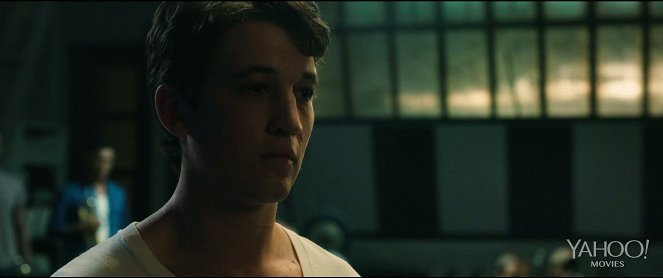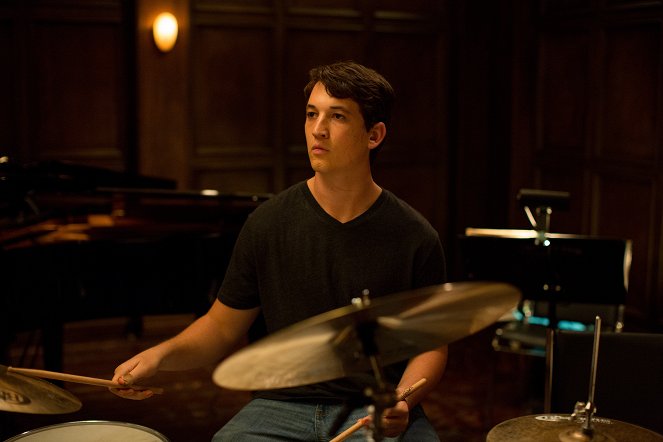Directed by:
Damien ChazelleScreenplay:
Damien ChazelleCinematography:
Sharone MeirComposer:
Justin HurwitzCast:
Miles Teller, J.K. Simmons, Paul Reiser, Melissa Benoist, Austin Stowell, Nate Lang, Chris Mulkey, Damon Gupton, Max Kasch, Jayson Blair, April Grace, C.J. Vana (more)VOD (4)
Plots(1)
Andrew Neyman (Miles Teller) is an ambitious young jazz drummer in pursuit of rising to the top of his elite music conservatory. Terence Fletcher (J.K. Simmons), an instructor known for his terrifying teaching methods, discovers Andrew and transfers the aspiring drummer into the top jazz ensemble, forever changing the young man's life. But Andrew's passion to achieve perfection quickly spirals into obsession, as his ruthless teacher pushes him to the brink of his ability and his sanity. (Sony Pictures Home Entertainment)
(more)Videos (5)
Reviews (14)
Whiplash works on the principle of a wrestling match. A treacherous, ruthless wrestler who breaks all fair play rules intentionally provokes the audience and tries to incite them against himself in order to (apparently) triumph over his opponent and whip up the emotions of the viewers to the maximum. The director manipulates his audience in the same way - and that's my fundamental problem with the film. I simply don't like manipulative directors, which is probably why I didn't warm up to Aronofsky and I have been avoiding Lars von Trier's recent works. On the other hand, Damien Chazelle brilliantly directed his film, and it's evident that he fulfilled the task he set for himself. He was able to lean on the excellent acting performances of both main actors, especially Simmons, who is absolutely convincing in the role of a tyrant, and it's clear that he savored that role. About halfway through the film, I said to myself: "Dear God, I'm watching a sports film whose scheme has been transferred to a different setting." This could actually work, more or less, in certain sports disciplines, such as combat sports, but it would probably work much worse, if at all, in team sports, because a similar coach's strategy would completely upset the team and ruin their psychology. And the idea that something similar could work in reality within a musical ensemble is completely absurd. However, yes, top conductors are often narcissists and it's not easy to work with them, but they would certainly not dare to apply something like that to their players, because only coordination ensures success. Moreover, I believe that in the school environment in America, they are very sensitive to barbaric behavior like that which conductor Fletcher exhibited toward his students, and he would come up against resistance from the students and their parents much sooner than the film suggests. In the end, I lean towards giving it only three stars because it's done for effect, which doesn't suit my taste. I want to believe in the film, and Chazelle didn't succeed in that. Overall impression: 60%.
()
Packed with energy (a real risk of leg cramps caused by nonstop stamping to the rhythm). Drummer Full Metal Jacket following the rhythm of the first Rocky movie which, however, often (and above all unnecessarily) scores its own goal by too obvious intensified emotional calculation in the behavior of (intentionally) not nice characters/plot twists. And so the same question can be applied to Whiplash, which the creators themselves indirectly ask the viewer during the footage: Was/is it worth it?
()
Spoilers ahead. Without psychologising and unnecessary plot digressions, Chazelle presents a chamber drama with the attributes of a psychological thriller whose rhythm is set by a confrontation between two very strong-willed sociopaths. The development of the narrative is as unpredictable as Fletcher’s teaching methods. As in jazz compositions, a brief release comes after the clashes escalate to the limit of a person’s physical capabilities and is soon followed by another dramatic crescendo. The way that Fletcher appears in a room, his predatory way of returning a gaze and the fact that we never see him in daylight are reminiscent of a monster from a horror movie. Under Fletcher’s influence, Andrew undergoes a transformation from a likable young man with big ambitions into a being that is as equally ruthless and indominable, a first-rate bastard, so to speak. While watching his development, we can ask whether extraordinary success must be preceded by submission and humiliation, the surrender of everything that makes us unique. In the end, Andrew may play without making mistakes, but he also plays without emotion or his own expressive feel. Does such music really represent the ideal self that he wanted to achieve? Chazelle doesn’t assert that it could be any other way in the competitive world of professional music. He doesn’t moralise or excuse the actions of either of the two main characters and, with the cynicism last demonstrated by Scorsese in The Wolf of Wall Street, he allows the two adversaries to devour each other. The film aptly references Rififi, which Andrew and his father go to see at the cinema. Like when committing a heist, there is no room for even a single ill-timed move when playing at the level Andrew desires. All parts of the body must be perfectly synchronized. It is not about the audience, but about the feeling of having full control over oneself and (essentially male) superiority over everyone else who fails to achieve the same level of precision. Like Fletcher and his obsession with tempo, Chazelle prides himself on flawless pacing. The film’s editing corresponds to the frantic drumming. The scenes set in the rehearsal room are precisely rhythmised according to Andrew’s drum hits and Fletcher’s assaults, thus transforming their (mostly) non-contact struggle into a brutal physical battle. The quick cuts between the close-ups of the musical instruments and the shots of body parts also create an effect evoking the merging of the musician with his instrument. Andrew literally lives his music. It characterises him and lends him a voice that can be heard. Therefore we hear it at the beginning before we even see the protagonist for the first time. The frenetic editing combined with the camera penetrating into the most intimate zone of the characters turns Whiplash into a very physical, horror-like experience. In a few places, the frontal assault on the senses has to be subordinated to the plausibility of the plot, into which several coincidences were not very artfully incorporated (the loss of the sheet music after Fletcher warns the musicians to guard it with their lives, the breakdown of the bus after Fletcher emphatically warns everyone to be on time for the concert). Due to the precedence of the visceral experience over probability and psychological motivations, this is not a drama of astonishing complexity, but I thoroughly enjoyed Whiplash as a thriller (on the big screen!). 80%
()
(less)
(more)
I long ignored this film due to its genre, but The Queen's Gambit has awakened something new in my film heart, a liking for sports or musical films, especially those about the journey to fame, where an outsider dazzles everyone, and this also applies to Miles Teller, who delivers a great performance. But it is J.K. Simmons who elevates the whole film from above average to perfection, covering 70% of the runtime, and whenever he is on screen, it becomes captivating, shocking, funny, rough, and uncompromising. He delivers a demonic performance, and for a long time, nobody in the film commanded as much respect as him. Surprisingly entertaining and engaging from beginning to end, the finale is exquisite. In the drama genre, I think it's the pinnacle. 10/10.
()
I don’t remember ever wanting to clap as hard during the end credits as I did this time. An excellent film, even though there is no one to root for and J.K. Simmons in particular portrays a monster only a tiny bit less scary than Anthony Hopkins’s character in The Silence of the Lambs. I wouldn’t be surprised if Whiplash wins Academy Awards for sound and editing, especially since it has no competition among music films with respect to sound.
()



Ads